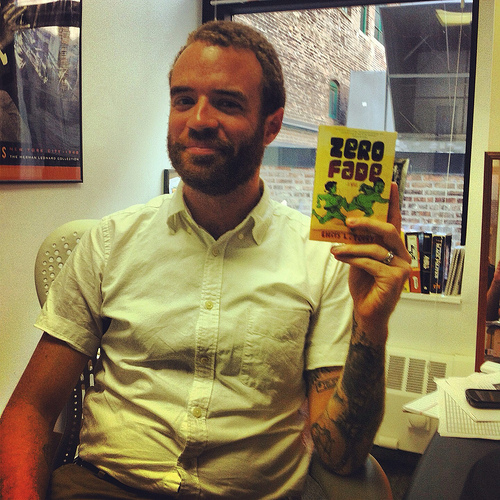
Interview with Chris Terry
[flickr id=”9729261203″ thumbnail=”medium” overlay=”true” size=”original” group=”” align=”none”]
I have a very special blog for you, MarginAliens! I interviewed Chris Terry, the man whose Graduate Ambassador position I took after he graduated from the Fiction MFA program here at Columbia. Recently, Terry had his first novel, Zero Fade, published by Curbside Splendor. I sat down with him to ask him a few questions about his novel, but we were more interested in talking about how it evolved as a result from his time in the program.
Terry started grad school in the fall of 2008, and he told me “part of the book starting toward the climax, a scene when the main character [Kevin] is at the mall with his sister” began the summer before he moved to Chicago. “As I was writing it, I started seeing more of what I wanted to do with the characters and it was more than the short story [I was writing] would allow. When I was deciding on my thesis [work], I came back to it.” He started working on it in Fiction I, and then his second semester, he took Laurie Lawlor’s Young Adult Fiction class, where he wrote the first 70 pages of his first draft. He “took the momentum [from the class] and finished a whole draft that summer, 2009. From there, I worked on it on and off the whole time I was in the program.” Terry also writes non-fiction about being the child of a black father and Irish mother, but he said he wanted to focus on a whole book for his thesis, so he chose to work on this with advisor Don DeGrazia.
Terry worked on a draft in this thesis development class with Alexis Pride and then worked on it in Audrey Niffenegger’s Big Books class. “When I graduated in 2012, it felt 80% done.” He woke up at 5:30 a.m. every day that summer to finish the book, writing for a few hours before his day job.
Terry found a lot of help and encouragement from his cohort of students. They told him they could see his work being in a book in the future, and that helped drive him forward. When I asked what the most important skill or tool he learned while attending Columbia, he said “Discipline. Learning to jump right into writing. Knowing that you have to clear away the voices that say, ‘Maybe this wasn’t right’ and just keeping the machine greased and moving forward.’” He said he liked to anticipate reader questions and got better at it the more he wrote, so he joked that he hoped there were no glaring holes.
Revision came up in our talk. As someone beginning the thesis journey, I was curious how long his revision process was. He told me he wrote five drafts, including the copy-editing drafts. I asked how supportive the faculty was. He mentioned that aside from his thesis advisor, he didn’t ask anyone else to read his work in the drafting stages (unless he had a class with them) because he knew how busy the faculty members were. Instead, I asked how one who wants to work on a novel could structure his or her classes.
“If you come in and already have a project, be open to trying other things,” he said. “You’re going to get asked to do assignments that you don’t think pertain to your project. Do them anyway. You never know what kind of light might get shed onto your work. It’s also something that you might blow off till 45 minutes before class. That’s okay, too, but keep thinking about what you want to write about [in the long run]. Thesis development is very helpful. Take that. YA [Young Adult Fiction] was helpful for me because it got me that first quarter of a book. You do a lot of writing in that class. Big Books is another one.”
He offered some parting advice. “Sometimes just write what you want—and also do the assignment. So you might turn in 15-20 pages of your novel and a folktale. That’s okay.” Terry mentioned that it is your work that comes first, and to make sure to fulfill the assignment, but to also fulfill your commitment to your work.
You can pick up a copy of Zero Fade at Amazon or your local indie bookstore (which is probably way cooler to do, anyway).
